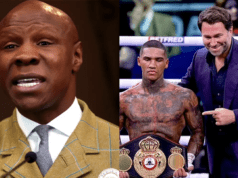Few issues have dominated the sporting landscape as the issue of steroids has. But the issue truly only penetrates a few sports. Baseball, with so much of its pride and identity based around a century’s worth of statistics combined with an inept reaction and complacency to the issue, has faced the strongest criticisms. Olympic sports, namely track and field, and cycling also suffer from repeated controversies.
The largest sport in America, football, has received a gold plated get-out-of-media-ire free syringe. Boxing has also received a pass, although the sport is far less mainstream than the NFL is in today’s society. Isn’t it strange that in our two most inherently violent sports we by and large turn a blind eye to the issue of steroids?
My interest here lies specifically in why steroids don’t seem to matter in boxing. In a sport in which men punch each other in the face and attempt to utilize their muscles, strength and speed of motion to inflict maximum damage, shouldn’t steroids be more of a hot button issue?
Fact: Boxers take Steroids
As the baseball world continually suffers from more exposed Hall of Fame – and in some cases, once in a generation – caliber players, the boxing world has seen some of the biggest names in the sport test positive for steroids. It has certainly not been limited to small time club fighters looking to make a few thousand bucks by smashing another guy’s face in.
A who’s who of the last decade of boxers have tested positive for steroids at one point in their career or another. This list includes Roy Jones Jr., the best boxer of his generation and longtime pound for pound king; Shane Mosley, who became entangled with BALCO; James Toney; and Fernando Vargas, who prior to his fights with Felix Trinidad and Oscar De La Hoya looked like a genetically altered and abused pit bull ready to be unleashed. Many other notable fighters, including the likes of Evander Holyfield, have been implicated in steroid use.
So Why Don’t People Care About Steroids in Boxing?
But the news of these positive tests triggered minimal reactions within the boxing community and in the larger world of sports and American society. One of the largest opinions on this, at least an opinion held by many of my boxing brethren, is that steroids don’t help a fighter in any significant way.
In boxing becoming more muscle bound can actually lead to decreased effectiveness. Consider that the more muscle mass you have the more oxygen you need to supply to them. In a stamina-intensive sport such as boxing, this increased oxygen demand can cause fighters to become fatigued earlier.
Also consider that fighters might take steroids to bulk up and move to higher weight classes. While they added muscle mass to their frame, they in no way increased the size of their frame. So by moving up to a higher weight class and facing naturally larger men, they still put themselves at a disadvantage.
Finally, consider that the best boxers rely on strict technical form that enables them to quickly and fluidly throw punches. Adding too much muscle can hinder the fluidity and speed of these technical motions, making a fighter’s punches slower, less effective and more easily avoided.
But outside of the boxing community, where this knowledge likely does not reside, steroid use in boxing is still largely glossed over. Why is this so?
A lack of media coverage enables stories to slip through the cracks. Boxing is not routinely covered in major newspapers and rarely cracks its way onto a SportsCenter broadcast. It’s not shown on network television and the sport rarely produces a crossover star that captures the public’s attention.
There are worse offenses in boxing, such as when a fighter uses illegal hand wrapping techniques to create a hardened, brick-like layer inside of his gloves. Antonio Margarito was recently suspended for a year for such an offense, although even his suspension did not draw massive outrage.
Suspensions are short and don’t always transfer uniformly. To begin with, steroid suspensions may only last for a few months. On top of that, no national commission in boxing means that each state draws up its own rules and regulations. While most states honor the suspensions another state inflicts, this can be circumvented. The suspension can also be avoided by fighting in another country, as Margarito plans to do. If the rules aren’t taken seriously and enforced uniformly, they cannot be taken as important or substantial.
Boxing is already considered by the masses to be corrupt and dirty, so who cares about a little steroid use? In a world where Don King screws over the fighters he has under contract as his entire, blatant business model, Mike Tyson bites off ears and threatens to eat another fighter’s (nonexistent) children and referees face assault at the hands of angry fighters, steroid use doesn’t really move the needle, take the pun for what you will.
People don’t care about steroids in boxing for a variety of reasons, but it doesn’t mean that they shouldn’t. Barry Bonds rearranging the baseball record books landed him in the cross hairs of the federal government for years. Shouldn’t there be some level of serious consequences for a boxer whose job is to try to rearrange his opponent’s face?










